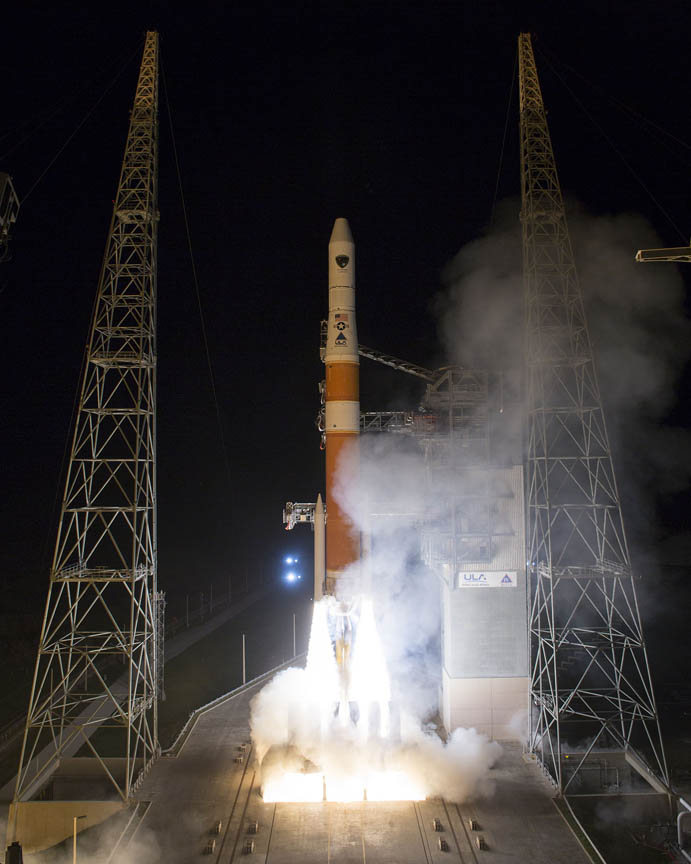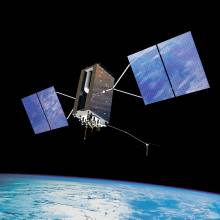 GPS Block IIF-5 on its way from Cape Canaveral on February 20, 2014. Photo by Ben Cooper, United Launch Alliance
GPS Block IIF-5 on its way from Cape Canaveral on February 20, 2014. Photo by Ben Cooper, United Launch Alliance[Updated May 26, 2015] The U.S. Air Force released a draft request for proposal (RFP) yesterday (May 13, 2015) for GPS III Launch Services, including launch vehicle production, mission integration, and launch operations. The Space Exploration Technologies Corporation — better known as SpaceX and headed by Elon Musk — may well enter the competition.
[Updated May 26, 2015] The U.S. Air Force released a draft request for proposal (RFP) yesterday (May 13, 2015) for GPS III Launch Services, including launch vehicle production, mission integration, and launch operations. The Space Exploration Technologies Corporation — better known as SpaceX and headed by Elon Musk — may well enter the competition.
On May 26 the Air Force Space and Missile Systems Center (SMC) and Air Force Program Executive Officer for Space announced the certification of Space Exploration Technologies Corporation’s (SpaceX) Falcon 9 Launch System for national security space missions.
SpaceX is now eligible for award of qualified national security space launch missions as one of two currently certified launch providers. The first upcoming opportunity for SpaceX to compete to provide launch services is projected to be in June when the Air Force releases a Request for Proposal (RFP) for GPS III launch services.
The draft RFP, released by the Air Force Space Command’s Space and Missile Systems Center, located at the Los Angeles Air Force Base, California, reflects the Air Force’s ongoing efforts to reintroduce competition into the Evolved Expendable Launch Vehicle (EELV) program. This is the first of nine space launch missions that the Air Force plans to compete in its EELV Phase 1A strategy.
"This is our first competition for EELV launch services in over a decade," said Lt. Gen. Sam Greaves, Air Force Program Executive Office for Space. "Our intent is to reintroduce competition while maintaining our focus on mission success in support of National Security Space launches."
The United Launch Alliance, a joint venture between Lockheed Martin and Boeing formed in May 2005, has provided GPS launch services using mostly Delta IV and a few Atlas V rocket.
Last year, SpaceX filed suit in the U.S. Federal Court of Claims against the U.S. government and ULA over the Air Force’s sole-source, five-year contract awarding EELV satellite launches to ULA. At the time, SpaceX said “[W]e stand ready and able to reliably provide launch services at an estimated cost savings of 75%.”
Because the Air Force had not certified SpaceX’s Falcon 9 rocket for launches of national security payloads such as GPS satellites, the company was unable to compete until now.
During the legal process, SpaceX filed a statement claiming that the Air Force had rejected the company’s unsolicited offer in 2012 to launch GPS III satellites for just under $80 million each. In January, after a Federal Court of Claims judge had ruled against efforts by the government and ULA to have the claim dismissed, SpaceX dropped its lawsuit when the Air Force agreed to expand opportunities for the company to compete for EELV business.
On May 8, SMC and SpaceX formally amended a cooperative research and development agreement (CRADA) signed by the two organizations in 2013 for EELV certification of the Falcon 9 launch system. The amended CRADA incorporates an independent review committee’s recommendations, including clarification that the SMC commander, as the certifying official, has the authority to grant certification based on a new entrant’s demonstrated capability to design, produce, qualify, and deliver their launch system.
The Falcon 9 Launch System carried SpaceX’s unmanned Dragon spacecraft, equipped with GPS receivers, into low Earth orbit in its first mission for NASA in 2012 as part of a mission to the International Space Station (ISS). In April Falcon 9 and Dragon carried out their sixth ISS commercial resupply services (CRS) mission; CSR-7 is planned for June
The Falcon 9 certification is the culmination of a significant two-year effort on the part of the Air Force and SpaceX to execute the certification process and reintroduce competition into the Evolved Expendable Launch Vehicle (EELV) program. The Air Force invested more than $60 million and 150 people in the certification effort, which encompassed 125 certification criteria, including more than 2,800 discreet tasks, 3 certification flight demonstrations, verifying 160 payload interface requirements, 21 major subsystem reviews, and 700 audits in order to establish the technical baseline from which the Air Force will make future flight-worthiness determinations for launch.
The certification process provides a path for launch-service providers to demonstrate the capability to design, produce, qualify, and deliver a new launch system and provide the mission assurance support required to deliver national security space satellites to orbit. According to SMC, this gives the Air Force confidence that the national security satellites being delivered to orbit will safely achieve the intended orbits with full mission capability.




